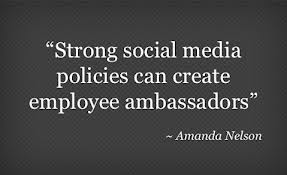 Over the last few years we’ve seen case after case of social media gone wrong, and it seems as if every day an employee goes off the wall and posts something online that harms the reputation of their employer.
Over the last few years we’ve seen case after case of social media gone wrong, and it seems as if every day an employee goes off the wall and posts something online that harms the reputation of their employer.
You don’t have to search for long on YouTube before finding videos of fast food employees brazenly breaking health code violations at work. The problem of social media foul-ups goes far beyond the occasional viral video, however.
In this connected age you can expect every one of your employees to have some kind of online presence, and without some sort of code of conduct in place, your business could bleed to death by a thousand electronic paper cuts as those employees alienate customers, complain about working conditions and, yes, occasionally post something so irresponsible that it becomes a deeply embarrassing viral phenomenon.
Why a Corporate Social Media Policy Can Help
People can be quick to judge any sort of corporate policy as yet another example of overreaching, of intruding into the private lives
of employees, but in fact a fair, well thought out social media policy should actually be welcomed by your staff.
Rather than a list of rules forbidding them from social media use, a good policy should focus on those things they CAN do, giving employees a clear and unambiguous idea of exactly where the line is drawn.
The recent explosion in social media use has not yet been met by the development of a widely accepted social contract to teach us all how to reconcile our work lives and social lives.
Sometimes people just can’t recognize when they’ve crossed the line, so a clear policy can be of great comfort. However, it’s equally important to encourage employees to speak positively about your business.
Banning any mention of their work lives may be the safest option, but in doing so you’ll lose out on the potential benefits social media can bring your business. Companies such as Dell capitalize on social media outlets such as Twitter to the tune of millions of dollars in sales each year, so it would be a mistake to simply block out the social world.
 What Your Social Media Policy Should Say
What Your Social Media Policy Should Say
Responsibility
Your policy should make it clear that employees are responsible for anything they post online that may reflect poorly on their employer. Rather than banning them from mentioning their work lives, simply let them know that they are responsible for the consequences of their actions. Freedom of expression comes at a price.
Legality
It should go without saying, but your policy should prohibit the sharing of proprietary information. Sharing trade secrets will clearly be banned, but you should also make them aware that seemingly innocuous information can cause harm too.
Time Management
You may want to prohibit the use of social media during work hours, but with the rise of smart phones and tablets that can no longer be accomplished with a simple block on the company network. Instead, you should consider allowing limited use during work but strongly discouraging extended use.
Monitoring
You must make it clear that your employees’ use of social media will be monitored both in and out of work. Just because an employee posts online from their home computer doesn’t necessarily mean that it will not be of interest to the business. Employee conduct doesn’t lose importance the moment the employee leaves the office.
Tone
Finally, whatever you include in your social media policy you should make an effort to make it easily understandable. Dense legalese may cover you in court, but your aim here should be to prevent problems from ever arising.
You must ensure that all employees truly understand what they can and can’t say on social media sites. You must also give them guidance on who to ask if they’re unsure of the rules, or if they find material online that contravenes the policy.
Writing an effective social media policy is like walking a tightrope. You don’t want to be too permissive nor too restrictive, and you want to keep your business safe, secure and productive while keeping your employees satisfied.
If you don’t already have a policy in place, one thing you can do today is sit down with your employees and ask their opinion. Collaboration is always a good place to begin.

